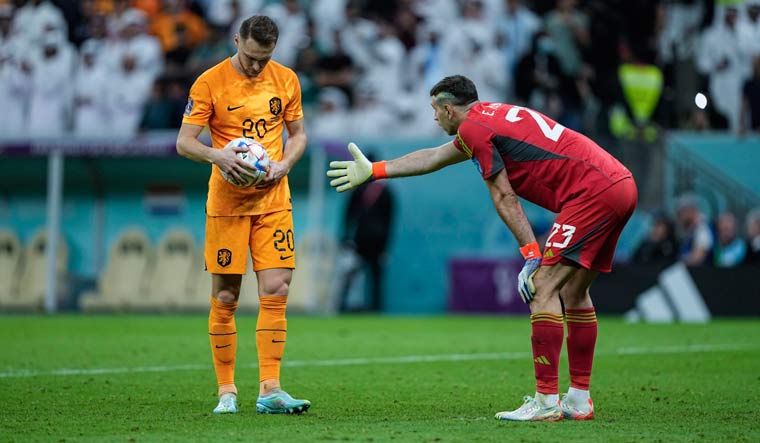Emiliano Martinez pulled up his shorts and performed a dance in front of Argentina's fans. Once again the Argentina goalkeeper was his country's penalty-shootout star, this time at the World Cup.
Martinez saved penalties from Virgil van Dijk and Steven Berghuis in a 4-3 shootout win over the Netherlands in the quarterfinals on Friday, after the match finished 2-2 after extra-time.
Mind games
Last year, in the Copa America semifinals, the Aston Villa goalkeeper opted for an unconventional, controversial strategy before stopping shots from Davinson Sanchez, Yerry Mina and Edwin Cardona as Argentina won 3-2 on penalties.
As Colombia's players got ready to take their kicks, the 30-year-old Martinez confronted them. "I am sorry, but I will stop you, bro," Martinez yelled before he saved from Sanchez.
"You're laughing because you're nervous," he then told Mina. "I know you."
Argentina went on to beat Brazil in the final to end a 28-year wait for a major title.
Martinez was hardly restrained against the Netherlands, either.
Before the shootout began, Martinez looked at the Argentina fans behind him and whipped them up. The noise was deafening inside Lusail Stadium as the Dutch players took their penalties.
When it was Berghuis's turn, Martinez took the ball from the Netherlands substitute to distract him.
Martinez then made the save and did a jig.
Not all goalkeepers are like Martinez. Each one has a strategy of his own.
With changes in law requiring the goalkeeper to keep one foot on the line, many believe the odds are in favour of the taker now. At the World Cup in Russia in 2018, for instance, 29 penalties were awarded and 22 were scored.
But, information is a great leveller, with the data available now on each player – both the goalkeepers and strikers – on their strengths and weaknesses and their routines. It then becomes a game of one-upmanship.
So, mind games are helpful. Norwegian sport psychologist Dr Geir Jordet's research shows that goalkeeper distraction techniques are linked with 10 per cent fewer penalty conversions, and long waits can reduce conversion by 20 per cent.
If that's not psychological, sample this. A player’s chances of converting a penalty if his team won its last shootout rises from 76 per cent to 83 per cent (and 89 per cent if the team won its last two shootouts). If the team lost, it drops to 72 per cent (and 57 per cent if two in a row).
Practice makes it perfect?
But, is psychology everything? The answer is as difficult as it is straightforward. No. But, practising helps. England coach Gareth Southgate, whose penalty miss in the 1996 European Championship semifinal against Germany cost his team the match, trained his squad in spot kicks ahead of the 2018 World Cup. He ensured they worked on their body language, too, for the penalty shootout. The result was a shootout win in the round of 16 match against Columbia - first in 28 years in a World Cup.
Former South Korea coach Guus Hiddink made his players walk from one penalty spot to the other in an empty stadium on the day before their 2002 World Cup quarterfinal against Spain. It was to prepare them for the walk from centre to the spot in the match. Result? South Korea won 5–3 on penalties.
But Didier Deschamps, who led France to the title in 2018, famously said he never makes his players practise penalties.
The other side
But, one has to admit that the pressure is, inevitably, more on the penalty taker.
"From a keeper's perspective, penalties bring less of a threat state and more of a challenge and an opportunity to be a hero," performance psychologist Tom Young once told ESPN.
Any talk about penalties, especially missed ones, brings to mind Italian star Roberto Baggio's costly miss in the 1994 World Cup final shootout against Brazil, with the ball sailing over the crossbar to hand the Selecao a famous win.
He is not the only one. The list includes other footballing greats like Sócrates, Michel Platini, Andriy Shevchenko and Diego Maradona.
One of Jordet's findings was that players who turn their backs on the keeper when preparing to take the penalty are more likely to miss. The quicker a player reacts to the referee's whistle, the more likely they will fail to score. The more the delay in taking the kick, the more the chances of a missed penalty.
Psychology or practice, it all boils down to who handles nerves better and uses his skill to the maximum from 12 yards out.



